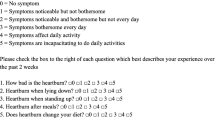Abstract
Background and Aims
Laparoscopic sleeve gastrectomy (LSG) might be associated with a new onset or worsening of gastroesophageal reflux disease (GERD). We aim to evaluate the prevalence of post-LSG GERD symptoms and its predictors.
Methods
We included patients who underwent primary LSG at a university hospital from 2009 to 2015. We used the GERD-Health-Related Quality of Life (GERD-HRQL) questionnaire and included questions regarding regurgitation to evaluate symptoms before and after LSG; each item was scored from 1 to 5 based on the symptom severity.
Results
A total of 213 patients (mean age, 36.08 ± 10.22 years; 48.36% were men) were included. The mean preoperative body mass index (BMI) was 47.84 kg/m2, mean percent total weight loss was 37.99% (95% CI, 36.64 to 39.34), mean percent excess weight loss was 84.14% (95% CI, 80.91 to 87.36), and the mean percent excess BMI loss was 84.17% (95% CI, 80.94 to 87.41). The mean heartburn score while standing increased (0.71 vs. 1.09, p < 0.01) as well as the score of heartburn requiring a diet change (0.67 vs. 1.16, p < 0.01) post-LSG. The scores for dysphagia, odynophagia, and regurgitation increased. New-onset heartburn was reported in 47.06% of our cohort. Those with high preoperative BMIs were less likely to develop new-onset or worsening symptoms of GERD (odds ratio [OR], 0.97; 95% confidence interval [CI], 0.95–0.99). More severe heartburn symptoms while standing were associated with higher risks of developing or worsening GERD symptoms (OR, 1.22; 95% CI, 1.01–1.47). None of the other variables could predict the development or worsening of the GERD symptoms.
Conclusion
Symptoms of heartburn and regurgitation are common after LSG; however, none of the variables preoperatively could strongly predict patients who would develop new onset or experience worsening of symptoms postoperatively.

Similar content being viewed by others
References
Finucane MM, Stevens GA, Cowan MJ, et al. National, regional, and global trends in body-mass index since 1980: systematic analysis of health examination surveys and epidemiological studies with 960 country-years and 9.1 million participants. Lancet. 2011;377:557–67.
Memish ZA, El Bcheraoui C, Tuffaha M, et al. Obesity and associated factors—Kingdom of Saudi Arabia, 2013. Prev Chronic Dis. 2014;11:E174.
Singh M, Lee J, Gupta N, et al. Weight loss can lead to resolution of gastroesophageal reflux disease symptoms: a prospective intervention trial. Obesity. 2013;21:284–90.
Velanovich V. The development of the GERD-HRQL symptom severity instrument. Dis Esophagus. 2007;20:130–4.
Tolone S, Savarino E, Yates RB. The impact of bariatric surgery on esophageal function. Ann N Y Acad Sci. 2016;1381:98–103.
Chiu S, Birch DW, Shi X, et al. Effect of sleeve gastrectomy on gastroesophageal reflux disease: a systematic review. Surg Obes Relat Dis. 2011;7:510–5.
Gagner M, Hutchinson C, Rosenthal R. Fifth International Consensus Conference: current status of sleeve gastrectomy. Surg Obes Relat Dis. 2016;12:750–6.
Almadi MA, Almousa MA, Althwainy AF, et al. Prevalence of symptoms of gastroesophageal reflux in a cohort of Saudi Arabians: a study of 1265 subjects. Saudi J Gastroenterol. 2014;20:248–54.
Sucandy I, Chrestiana D, Bonanni F, et al. Gastroesophageal reflux symptoms after laparoscopic sleeve gastrectomy for morbid obesity. The importance of preoperative evaluation and selection. N Am J Med Sci. 2015;7:189–93.
Hendricks L, Alvarenga E, Dhanabalsamy N, et al. Impact of sleeve gastrectomy on gastroesophageal reflux disease in a morbidly obese population undergoing bariatric surgery. Surg Obes Relat Dis. 2016;12:511–7.
Del Genio G, Tolone S, Limongelli P, et al. Sleeve gastrectomy and development of “de novo” gastroesophageal reflux. Obes Surg. 2014;24:71–7.
Bolier EA, Kessing BF, Smout AJ, et al. Systematic review: questionnaires for assessment of gastroesophageal reflux disease. Dis Esophagus. 2015;28:105–20.
Fischer L, Wekerle AL, Bruckner T, et al. BariSurg trial: sleeve gastrectomy versus Roux-en-Y gastric bypass in obese patients with BMI 35–60 kg/m(2) - a multi-centre randomized patient and observer blind non-inferiority trial. BMC Surg. 2015;15:87.
Acknowledgements
The authors extend their sincere appreciation to the Deanship of Scientific Research at King Saud University for funding this research through the Research Group Project number RGP-279.
Author information
Authors and Affiliations
Contributions
Majid A Almadi: analysis of the data; writing, drafting, and revising of the manuscript for important intellectual content; and final approval of the version to be published
Saad Althuwaini, Fahad Bamihriz, Abdullah Aldohayen, Waleed Alshammari, Saleh Alhaidar, Mazen Alotaibi, Abdullah Alanazi, Hossam Alsahabi: acquisition of data, revising of the manuscript critically for important intellectual content, and final approval of the version to be published
Corresponding author
Ethics declarations
Conflict of interest
The authors declare that they have no conflict of interest.
Rights and permissions
About this article
Cite this article
Althuwaini, S., Bamehriz, F., Aldohayan, A. et al. Prevalence and Predictors of Gastroesophageal Reflux Disease After Laparoscopic Sleeve Gastrectomy. OBES SURG 28, 916–922 (2018). https://doi.org/10.1007/s11695-017-2971-4
Published:
Issue Date:
DOI: https://doi.org/10.1007/s11695-017-2971-4




